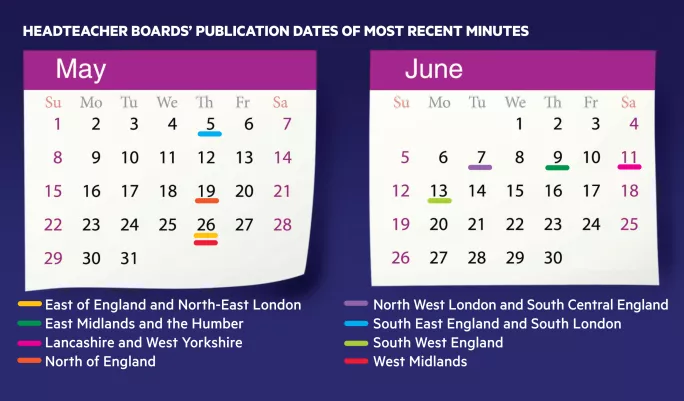‘Secrecy’ of RSC advisory board meetings denounced

Powerful official committees that help make key decisions about the future of hundreds of schools have not released any record of their activities for more than half a year, TES can reveal.
The news that none of England’s regional headteacher boards (HTBs) have published minutes since June, has led critics to condemn the “secrecy” surrounding the government’s academies programme.
Conservative chair of the Commons Education Select Committee Neil Carmichael told TES: “There’s a paucity of useful information available online about the work of headteacher boards. Failing to publish meeting minutes in a timely fashion does little to improve this potentially promising component of the regional schools commissioners (RSC) system.
“The Department for Education [DfE] and RSCs need to up their game and ensure up-to-date information is published to ensure there is transparency and accountability.”
Powerful figures
His committee warned in January about a lack of transparency in RSCs’ work. The eight regional commissioners, and the HTBs that advise them, have become some of the most powerful figures in the education system.
The government had promised more openness about how the boards operate, but TES has discovered that one board, for South East England and South London, has not published the minutes of any meetings since 5 May.
The boards meet in private up to twice a month and help decide which schools become academies, who runs them, which schools are not performing well enough and which free school applications are approved.
The most up-to-date record of any HTB meeting was for the South West region’s board on 13 June, when decisions affecting more than 30 schools and colleges were discussed (see box, below).

Robert Hill, an education consultant and former Downing Street adviser to Tony Blair, who describes himself as “broadly speaking, pro-academy”, called for parents to be given information about what was happening to their schools, and why.
“This is an area where we need transparency,” he said. “We need to have some understanding of why schools are going to some trusts rather than others. We are talking about a lot of public money moving about.
“On the whole, I think most RSCs and HTBs would generally be acting from good motives, but we need to operate in a transparent environment and we need to let the light in.”
His views were echoed by Angela Rayner, Labour shadow education secretary, who said it was “absolutely unacceptable” that no minutes had been published since prime minister Theresa May took office.
“The Tories promised to be the most transparent government ever, but this shows that they are creating a schools system that is not accountable to the parents, families and communities that they serve.
“We must be allowed to know the decisions that commissioners make on our behalf and properly scrutinise how they have been made.
“Secrecy will just fuel suspicions that they are pushing ministers’ plans for forced academisation by the back door.”
Follow councils’ lead
Richard Watts, chair of the Local Government Association’s Children and Young People board, contrasted the lack of information about the operation of the RSCs and HTBs with the requirements for openness when councils made decisions about maintained schools.
“Councils discuss finance issues with all local education providers, including academies and free schools,” the Labour councillor said. “They run these school forums as public meetings with minutes and papers published on the council website. The same transparency requirements should be placed on the decisions of the RSC and headteacher boards.”
The DfE was contacted for comment.
You need a Tes subscription to read this article
Subscribe now to read this article and get other subscriber-only content:
- Unlimited access to all Tes magazine content
- Exclusive subscriber-only stories
- Award-winning email newsletters
Already a subscriber? Log in
You need a subscription to read this article
Subscribe now to read this article and get other subscriber-only content, including:
- Unlimited access to all Tes magazine content
- Exclusive subscriber-only stories
- Award-winning email newsletters